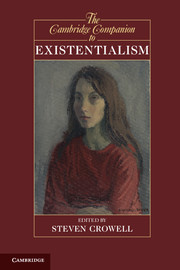Book contents
2 - Existentialism as a philosophical movement
from II - Existentialism in Historical Perspective
Published online by Cambridge University Press: 28 March 2012
Summary
THE EXISTENTIALIST “FAMILY”
Most popular characterizations of existentialism – for example, “the metaphysical expression of the spiritual dishevelment of a post-war age” – apply at best to the cultural movement described in Chapter 3 of this Companion. While some of the concerns of existentialist philosophy – such as the significance of death or the scope of individual moral responsibility – may become especially urgent under certain historical conditions, they are perennial ones, without date or place. Still, those popular characterizations have the advantage that no one denies the reality of the cultural phenomenon they describe – one captured on film, in memoirs, and still present in the memories of elderly people who, in their youth, were right there and experienced it. A set of young people really did, as Simone de Beauvoir recalled, label themselves “existentialists,” wear an all-black uniform, frequent the same cafés, and assume an air of ennui.
The reality of existentialism as a philosophical movement, by contrast, has sometimes been doubted. It has been denied, that is, that there ever was a distinctive philosophical perspective or tendency shared by those thinkers who have been labeled “existentialists.” Thus Paul Ricoeur, in the course of repudiating Søren Kierkegaard's reputation as “the father of existentialism,” asserts that “the supposed family of ‘existentialist’ philosophies never really existed,” so that there was nothing for Kierkegaard to have fathered. The only reason that Ricoeur gives for this verdict – that the “family” soon “collapsed” – is, however, inconsistent with it.
- Type
- Chapter
- Information
- The Cambridge Companion to Existentialism , pp. 25 - 49Publisher: Cambridge University PressPrint publication year: 2012
- 6
- Cited by

